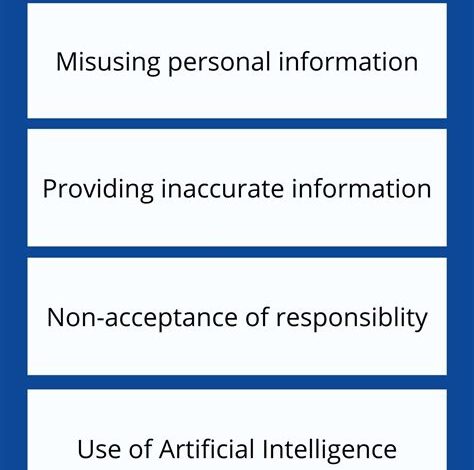The Ethical Implications of Technology Advancements

Explore privacy concerns, algorithmic bias, AI job displacement, e-waste, and ethical considerations in biotechnology. Learn the impact on society and the environment.In today’s rapidly evolving technological landscape, the ethical implications of technological advancements have become increasingly relevant and concerning. As we continue to embrace new technologies, we also need to consider the potential impact on privacy, discrimination, job displacement, environmental sustainability, and biotechnology ethics.
From the collection and use of personal data to the potential biases in algorithms, the advancements in technology have raised significant concerns about privacy and discrimination. Additionally, the rise of artificial intelligence has led to discussions about the displacement of jobs and its impact on society. As we upgrade to newer and faster electronic devices, the generation of e-waste has also become a pressing environmental issue. Finally, the advancements in biotechnology have posed complex ethical dilemmas that require careful consideration.
In this blog post, we will delve into each of these subheadings and explore the ethical implications associated with them. It is crucial to critically analyze these issues and engage in meaningful discussions to ensure that technology advancements are aligned with ethical values and principles.
Privacy Concerns in Data Collection
With the rapid advancements in technology, data collection has become more prevalent than ever before. Organizations, both big and small, are constantly collecting and analyzing massive amounts of data from their users. While this may seem like a harmless practice aimed at improving user experience, it has raised significant privacy concerns among consumers and experts alike.
One of the major ethical implications of data collection is the potential for misuse and exploitation of personal information. With the accumulation of vast amounts of data, there is a risk of this information being mishandled or falling into the wrong hands. This has led to growing concerns about data security and the potential for data breaches that could compromise the privacy and safety of individuals.
Another ethical consideration in data collection is the lack of transparency and consent from users. Many individuals are unaware of the extent to which their data is being collected and utilized, leading to a lack of control over their own personal information. This raises questions about informed consent and the need for more stringent regulations to protect user privacy.
Algorithmic Bias and Discrimination
The Ethical Implications of Technology Advancements
Algorithmic bias refers to systematic and repeatable errors in a computer system that create unfair outcomes, such as privileging one individual or group over another. With the increasing integration of artificial intelligence (AI) in decision-making processes, there is growing concern about the potential for algorithms to perpetuate discrimination and bias. For example, in the criminal justice system, algorithms used to predict the likelihood of re-offending have been found to disproportionately label Black defendants as higher risk compared to their White counterparts, leading to unequal treatment in sentencing. This raises serious ethical questions about the use of AI and the need for accountability and transparency in algorithmic decision-making.
Discrimination in technology is not limited to AI algorithms, but also extends to biased design and implementation of technological products and services. For instance, facial recognition software has been found to have higher error rates for darker-skinned individuals, leading to potential misidentification and surveillance of minority groups. Similarly, biased language models trained on large datasets have been shown to perpetuate stereotypes and derogatory language towards certain demographics, further exacerbating social inequalities. These instances highlight the importance of addressing bias and discrimination in the development and deployment of technology to ensure equitable and ethical outcomes.
Efforts to mitigate algorithmic bias and discrimination require a multifaceted approach involving diverse representation in technology development, rigorous testing and evaluation of algorithms, and robust regulations and oversight. It is essential for organizations and policymakers to prioritize fairness, equity, and justice in the design and deployment of technology, and to actively work towards minimizing bias and discrimination. Ultimately, fostering ethical advancements in technology necessitates a collective commitment to upholding human rights and promoting inclusivity and diversity in the digital age.
Impact of AI on Job Displacement
The Ethical Implications of Technology Advancements
Advancements in artificial intelligence (AI) have brought about significant changes in the job market, leading to concerns about job displacement. As AI technology continues to evolve, there is growing apprehension about the future of employment and the potential impact on the workforce. The increasing use of automation and machine learning algorithms has raised questions about the extent to which jobs traditionally performed by humans could be replaced by robots and AI systems.
Furthermore, the implementation of AI in various industries has led to discussions about the ethical implications of job displacement. The potential loss of livelihood for workers and the unequal distribution of benefits from AI technology has sparked debates about social justice and fairness. There are concerns about the widening gap between those who have access to opportunities created by AI and those who are left behind due to job displacement.
It is crucial for stakeholders to consider the ethical dimensions of AI deployment and job displacement. Policies and regulations need to be developed to ensure the responsible and equitable use of AI technology in order to minimize the negative impact on the workforce. Additionally, efforts to retrain and upskill workers who are at risk of job displacement are essential to mitigate the social and economic ramifications of AI advancements.
Environmental Impact of E-waste
Advancements in technology have undoubtedly improved the quality of our lives, but they have also brought about a new set of ethical concerns. One of the most pressing issues is the environmental impact of e-waste. As technology continues to evolve at a rapid pace, millions of electronic devices are being discarded every year, leading to a significant increase in electronic waste. The improper disposal of e-waste can have serious consequences for the environment, including soil and water contamination, air pollution, and the release of hazardous chemicals.
Furthermore, e-waste often ends up in developing countries, where it is dismantled and recycled in unsafe conditions, posing serious health risks to the workers involved. This raises important ethical questions about the responsibility of developed nations in managing their electronic waste and the duty to protect the rights and well-being of those in the global community.
It is crucial for individuals, businesses, and governments to take proactive steps towards sustainable e-waste management. This includes promoting the recycling and safe disposal of electronic devices, investing in eco-friendly product design, and advocating for stricter regulations on e-waste disposal. By addressing the ethical implications of e-waste, we can work towards a more sustainable and responsible approach to technology advancements.
Ethical Considerations in Biotechnology
Biotechnology has undeniably revolutionized the fields of medicine, agriculture, and industry, offering a range of potential benefits. However, with these advancements come numerous ethical considerations that must be carefully addressed. One of the primary concerns surrounding biotechnology is the potential for misuse and unintended consequences. The ability to manipulate genes and create genetically modified organisms raises questions about the impact on ecosystems and the potential for unforeseen harm. Additionally, there are ethical dilemmas surrounding the use of biotechnology in human enhancement, such as the creation of designer babies or the potential for genetic discrimination.
Another area of ethical concern in biotechnology is the issue of informed consent and the potential for exploitation. As biotechnological advancements continue to progress, the need for clear, transparent consent processes becomes increasingly important, particularly in areas such as genetic testing and organ donation. Without proper safeguards in place, there is a risk of vulnerable individuals being taken advantage of or coerced into participating in biotechnological procedures against their will.
Furthermore, biotechnology raises important questions about equity and access. The potential for new medical treatments and enhancements could exacerbate existing disparities, widening the gap between those who can afford the latest technologies and those who cannot. This highlights the need for careful consideration of the social and economic implications of biotechnological advancements, ensuring that these innovations are accessible to all, regardless of their socioeconomic status.





